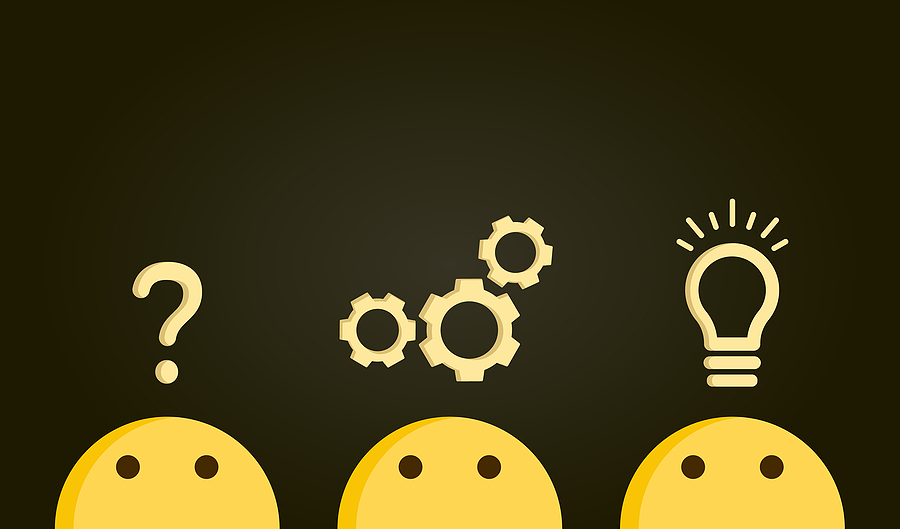As a parent, I’m never able to predict which of my comments my kids will latch onto. One recent evening, for example, one of my little ones was peppering me with questions as if he were an expert interrogator. I did my best to keep up but could feel my resolve slipping away. Finally, in an act of defeat, I declared I had no more answers. My answer bank was empty.
Comparatively speaking, the decision fatigue I felt that day was a microcosm of what we’ve all been experiencing over this past year. In the best of times, it is estimated that our unconscious brains gather 11 billion bits of information every second.
Yet, our conscious brain can only process 40 bits of information at a time. It’s no surprise our neural circuits are overloaded – particularly on busy days and during stressful times.
To add to this strain, our brains detest the vast amount of uncertainty we’ve been navigating over this past year. Even if you removed all the other global stressors, uncertainty alone creates a thick base layer of stress. On the contrary, we humans crave certainty and predictability. Our brains have evolved to function as fine-tuned prediction machines. We like to know what is coming around the corner.
Our brains are constantly scanning for new information in an effort to strengthen our internal prediction algorithms. The internet is primed to provide us with a cognitive sugar rush every time we read something interesting and, as a result, our fingers perform endless scrolling. The more we hear, the more we want to hear. There is an unlimited supply of information to match our equally unlimited appetite for information.
So, here we are – stuck in an endless loop of seeking more information to help compensate for this feeling of information overload.
How can we take back control and regain our footing? I’ve been exploring this question for years. Here are the three most effective approaches to mitigate information overload and avoid unnecessary stress.
1. Block your interruptions
We are bombarded with interruptions, which comes as no surprise. We can barely finish our question for Alexa before our attention is distracted. Yet, we know choppy work comes at a steep price. We’re less efficient, create lower quality work and feel far more stressed.
No, we can’t eliminate interruptions. But we are far from powerless. The truth is, we have plenty of practical opportunities to block these interruptions and stem the onslaught of information. Just because we can check for messages at any time doesn’t mean we should. We can turn off our alerts, let calls go to voicemail, and employ the ‘so effective it’s almost sneaky’ stand-up technique.
True, we can’t block every interruption. Sometimes you just need to pick up that call. And the grocery delivery isn’t going to put itself in the fridge. But we can manage most of our interruptions. And in doing so, we tame the overload monster.
For more on how you can manage interruptions and build more focus time into your day, you can download our Participant Guide for our program The Power of Focus. The Power of Focus is available online/on-demand as part of the Own Your Time Productivity Series.
2. Don’t let email rule your day
Email is a huge source of overload. I often see people unconsciously shudder when describing their inbox. Email overload truly is a universal pain point, which is what compelled me to write my first book: The Email Warrior.
With email, it’s not so much about the information but rather our anticipation of what’s to come. ‘Has Morgan gotten back to me yet? Have I received any new client requests since I last checked six minutes ago?’ The temptation to check is practically irresistible, which is why so many people are on email alert all day long and from multiple devices.
Ironically, the best way to manage email is to stop checking email. At least stop checking it all the time. Rather, we should check email in batches throughout our day.
Think you can’t let email sit? I encourage you to think again. Often, it’s our own curiosity rather than a sense of urgency, compelling us to check email relentlessly. Thankfully, if an email truly is urgent, they will find us. We’ve all had that call, “So I just sent you an email …”.
If email is ruling your days, I recommend the 3D Approach: Dedicate time; Do it now; Defer as necessary. Try these strategies to reduce the incoming volume of messages (yes, this is possible).
3. Limit yourself to three
We have an abundance of choice when it comes to setting goals and dreaming up our next great achievement. Our range of opportunities is a gift. But we all know too much of a good thing is detrimental. When we have too many priorities, we become over-committed and overloaded with information.
The word priority is actually singular, designed to connote the single most important thing. I admit having one priority is likely overly idealistic, but we don’t want any more than three. Three priorities – this is our sweet spot, the balance where we make the most progress on our most important work. When we commit to these three priorities, we amplify our resilience to information overload.
Related: This is the most important productivity tool you need
If you’re struggling to choose your core priorities (there are too many good options!), consider using The Simplify Filter to streamline, scale back and seek help.
I hope these strategies can help you avoid living with an “empty answer bank.” Of course, I woke up the next day with a fresh bucket of answers. And yet, every now and then the kids still ask whether Mom has any answers left. Despite all my answers since then, this was one of the messages that stuck with them. 😊
How do you handle information overload? Please let us know in the comments. The more we can share and help each other, the more we can all tame the overload monster.








Leave A Comment